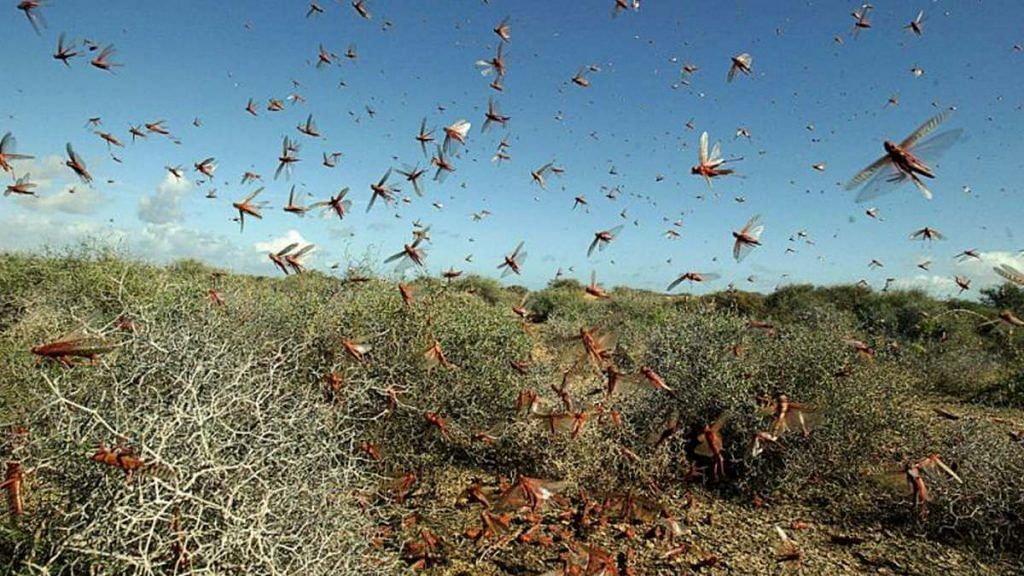New Delhi: It’s not just coronavirus. India and Pakistan are facing another shared challenge in a locust plague threatening crops along their border, and New Delhi has issued a terse request to Pakistan for cooperation.
India has taken up the matter with Pakistan as well as Iran, another country affected by the locust attack, and offered pesticide support to both countries, sources said.
“This year, in addition to the Covid pandemic, a new challenge is facing the people of the South Asia and South West Asia region is that of Desert Locust …” said an official. “India has suggested to Pakistan that both countries coordinate locust control operation along the border and that India can facilitate supply of pesticide Malathion to Pakistan,” the official added.
With Pakistan, there is an existing institutionalised mechanism for such cooperation, including regular border meetings between the locusts officers of the two countries, the official said. Additionally, the official added, India plans to establish a ‘Locust Warning Organisation’ between the two countries.
As for Iran, New Delhi has offered to supply pesticide to Tehran for ‘desert locust’ control operations in Sistan-Balochistan and South Khorasan provinces. These efforts, the official said, will contribute to mitigating the effect of the desert locust not only in these countries, but also for India.
“Iran has already responded positively to the Indian offer. It remains to be seen if Pakistan will rise above its narrow-minded approach, as was seen in the case of India’s regional initiative for dealing with COVID, and come forward with cooperation on coordinated desert locust control operation with India,” the official added.
Also Read: The ‘insect plague’ that’s eating crops in India & why monsoon may not bring good news
A new threat
A vast population around the world – in Africa and Asia – has been dealing with an onslaught of desert locusts that threatens to raze vast swathes of crops. The current plague has been attributed to a series of cyclones in the Indian Ocean that hit a sandy area in the Arabian peninsula, which provided hospitable breeding conditions for locusts.
The desert locust is one of 12 species of short-horned grasshoppers. Swarms can comprise billions and travel up to 130 km in a day.
“A Desert Locust adult can consume roughly its own weight in fresh food per day, that is about two grams every day. A 1 km2 size swarm contains about 40 million locusts, which eat the same amount of food in one day as about 35,000 people. This is based on a person eating an average of 2.3 kg of food per day, according to the USDA (US Department of Agriculture),” the UN Food & Agriculture Organisation. In short, they can eat a lot — in a day, a swarm the size of Paris can eat the same amount of food as half of France. A locust infestation can thus devour crops and threaten livelihood and sustenance in poorer nations.
There is consensus that the desert locust could pose a grave challenge in 2020, destroying valuable crop. A warning issued by the FAO on 2 March described the situation as extremely alarming, especially in Kenya, Ethiopia and Somalia.
India has been battling the locust attacks with moderate success since December. However, the onset of monsoon could bring more trouble.
Around 88 per cent of the total 1,68,548 hectares of affected farmland have witnessed a severe crop loss of more than 33 per cent, leading to damages in crores.
Rajasthan has borne the brunt of the locust attacks — 1,49,821 hectares were damaged, of which 1,34,959 hectares sustained severe crop damage of over 33 per cent. In Gujarat, 18,727 hectares of farmland was affected.
The majority of the damaged crops comprised wheat, mustard, oilseed and cumin.
With inputs from Samyak Pandey
Also Read: SAARC meeting on COVID confirmed 2 things – Pakistan is petty and India isn’t as big as China
